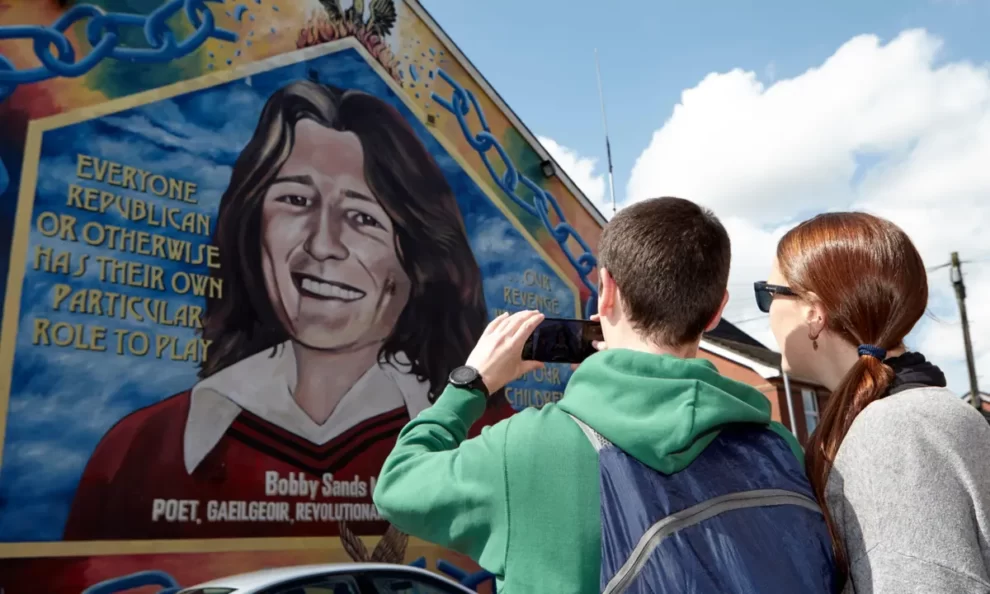Interviewees in history documentaries tend to be historians and curators; people with specialist knowledge, capable of explaining the facts in a detached manner. But what of people who are not experts, but for whom this history – that of how the nations of the United Kingdom formed the current union – is living and central to their sense of identity?
For them, history is not remote or distant, but alive and present in their lives and in the national debate. It is also contested.
So, as part of a new series I have produced for the BBC, Union With David Olusoga, we set about speaking to people from all parts of the country: from former industrial heartlands such as Glasgow, Belfast and the Welsh valleys to villages and market towns in Wiltshire, Perthshire and Coleraine. They were students, shopkeepers, artists, soldiers, teachers, doctors, drivers and factory workers. We found that people were very keen to talk about the history and their relationship with it.
In Northern Ireland, I interviewed people from Catholic and Protestant communities, including those for whom the Troubles are a powerful memory, as well as those born after the Good Friday agreement – young people navigating a country still recovering from events they have no first-hand experience of.
History collided with the present in a particularly stark way in Belfast. By complete coincidence, on the day we were setting up our cameras news broke that the census had revealed that for the first time Northern Ireland – a state created deliberately to be majority Protestant – was majority Catholic.
On that day many talked about the continuing impact of the plantation of Ulster. Launched in 1610 and sanctioned by King James it enabled English and Scottish Protestant settlers to confiscate land and property from the indigenous Irish Catholics. Aaron, whose home town was established by one of these English “planters”, described how today “many of these communities are still intact”.
Andrew, a university student, shared that he was descended from planters but he viewed this without hesitation as “a system of colonisation”. While Lauren, a young Protestant, believed the history of the plantation meant that some people still didn’t think “people like me belong here”.
In Scotland, the subject of the battle of Culloden in 1746, when British troops fought Jacobite rebels, still raises powerful emotions among many, such as Rebecca who described it as “a massacre of Scots”. Yet, other Scottish people identified the economic benefits of the 1707 Act of Union, pointing out that Glasgow (where we were filming) was a city that became wealthy and influential through the lucrative tobacco trade.
In Wales, the tradition – established in the 14th century – of bestowing the title Prince of Wales on the heir to the British throne raises powerful condemnation from some. Mel told me, “The Prince of Wales was imposed on us”, while Luke wanted this tradition to end: “I don’t think there’s a need for it, I don’t think there’s a want for it.” These are not extreme views. After the death of the Queen, #NotMyPrince trended on social media and one poll found more than 30% of people in Wales wanted the title abolished.
And it wasn’t just nationalist sentiment that was driven by historical events. We interviewed people across the UK who rejected nationalism and pointed to the continuing impact of one of the great forces in British history – social class. For them, the history of the working-class experience crossed national borders.
In Scotland – a nation where in the early 19th century only 0.2% of the population were allowed to vote – Brian argued that he saw “no difference between being a worker in Bolton or a worker in Glasgow”, and that the fight for representation was “a working-class fight rather than a Scotland v England fight”. Some people talked about historical moments such as the Peterloo massacre in 1819 or the Newport rising of Chartists in 1839. In Northern Ireland, Tommy from Belfast, reflecting on the Protestant and Catholic communities in his home city, told me: “We have more in common as working-class people.”
The historical experience of Black Britons was also important in shaping identity. Shaniqua describes herself as “Black British Caribbean” and is one of a number of young people who talked about the Windrush generation. Many from northern England focused on more recent, postwar history: for them the decline of previously thriving industrial heartlands in the second half of the 20th century was evidence of a huge political and economic imbalance between London and the rest of England. This, argued Eddy from Tyneside, gave rise to “stronger regional identities … which is not good for anyone”.
What we learned is that across the UK there are not only multiple ideas of national identity, but there are many different moments in the history of the country that shape the way people think about themselves and where they live, moments that continue to define their lives.
Source: The Guardian
















